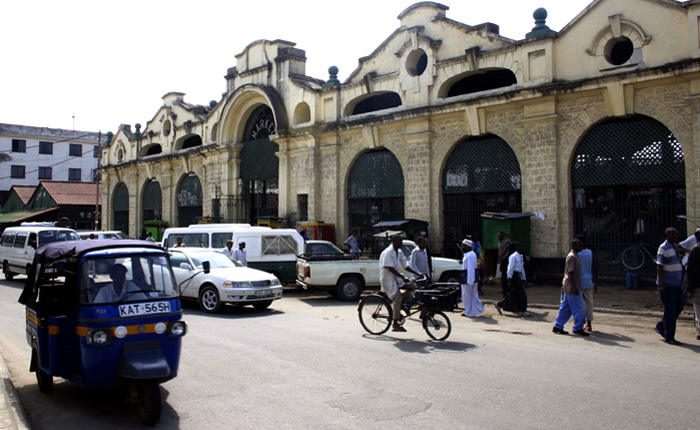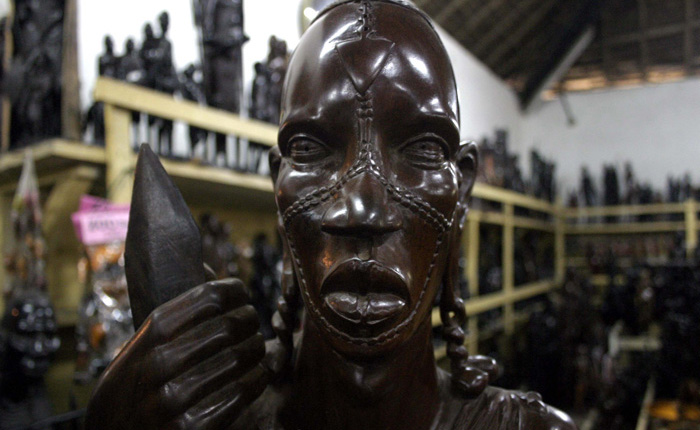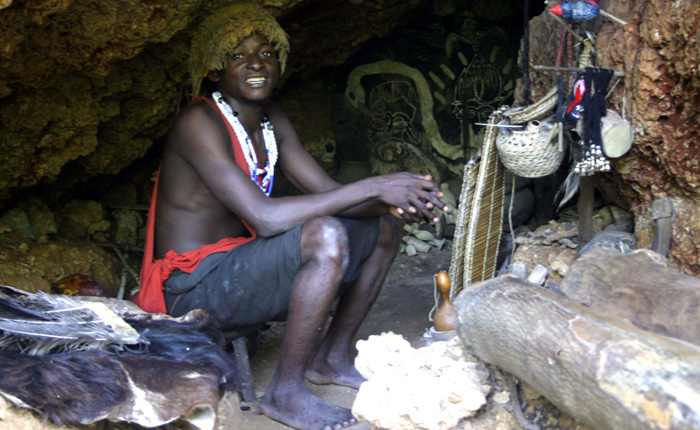Walk seven times around a baobab tree and the devil that lives in it will make you change sex.
Well, that's according to the local tribal legend in Kenya. Thankfully my treehouse didn't completely surround the vast old baobab that supported it. So no danger of taking a wander in the night and turning into a girl. A craggy branch snaked its way across the open-air bathroom and I dined on my balcony 20 feet above the sand, yellow baobab fruits the size of rugby balls swaying a touch worryingly above my head. From my vantage point I could look out across the infinity pool to white sand and azure waves.

Kenya's well known as one of Africa's best safari destinations, but less appreciated for its miles of sandy beach, sparkling coral reefs and Islamic culture. Much of the shore around Mombasa, Kenya's second city is palm-to-palm resort hotels. Nothing wrong with that. If you're looking for a good value family beach holiday with stacks of culture Kenya has lots to offer.
But how about something a little special? Until recently there wasn't much in the way of secluded luxury; so boutique hotel The Cove is a bit of a find. Hidden away on a beach all of its own, it features a cluster of treehouses, all beautifully appointed.
After fresh seafood for dinner, I retired to a huge divan of cushions and listened to the distant waves and that old tree rustling in the evening breeze, a lantern carved with intricate metalwork creating flickering shadows. There was even a hot tub up there on my balcony. I wallowed looking up at the bright stars of the milky way; indeed a heavenly sensation.
There's far more to the Kenyan coast than sandy beach and seafood suppers though. You can stay cocooned in your boutique hideaway, but why go all that way without experiencing the culture?
Kenya is enthralling and you need to get a little of its grit under your fingernails to appreciate it. The people are stunningly friendly. Many live in grinding, dusty poverty, but all without exception smile and wave as you drive by.
It made me think about things you wouldn't normally trouble yourself with on holiday. (Travel after all is about broadening the mind as well as the waistline.) We might stress about our pensions but these people have to take each day as it comes. Hakuna matata was one of the first phrases I learnt in Swahili. It means ‘No worries’ and it seemed apt.
 Mackinnon Market is a sweaty jumble of stalls selling bright fruit and vegetables, scary meat and pungent spices.
Mackinnon Market is a sweaty jumble of stalls selling bright fruit and vegetables, scary meat and pungent spices.Mombasa offers local culture and colour in elephant-sized portions, a cacophony of noise and dust. I wandered around the market and immediately acquired a bunch of self-appointed minders trying to sell me nuts, fruit and chewing gum.
Along with the mangos and bananas you could pick up another worker for your plantation in the 19th century here. The market is still known as Mackinnon Market after Scottish industrialist Sir William Mackinnon who worked to banish the African slave trade. A spice shop nearby proved more fruitful for relaxed shopping than the market. I filled up my stock of spices for the next 6 months for less than £10.
And Mombasa is garam masala. Conquered consecutively by Christians from Europe and Muslims from Arabia, trading all the while with merchants from Asia, it's the ultimate melting pot. You see these influences everywhere: British colonial mock Tudor administrative buildings, Islamic houses and mosques, Christian fortresses.
Read more > Lost in the temples in Mexico
The Portuguese Fort in the old town is a sanctuary from the brouhaha of the dusty streets. I wandered its crumbling crenellations in the noonday heat, gusts of cool breeze suddenly hitting me as I walked past the air holes carved through its thick walls. Crows cawed in the ancient tamarind trees that lined the small courtyard. The views from up on the walls showed what a strong position the fort occupied, looking far out across the estuary.
The Portuguese didn’t hold out in their fortress though. Muslim raiders came from Oman at the request of the local populous and after two years of siege the fort fell and its occupants met a bloody end. The influence of Islam remains particularly strong. Eighty percent of the population is Muslim, but it's very relaxed.
The old town is a maze of alleyways lined with three storey houses many with creaky, battered Arab-style balconies. The white African mosque on the main street seems incongruous among the tourist shops selling carved elephants and giraffes, pseudo antiques, toys fashioned from Fanta bottle tops and shoes made from car tyres. Whilst the hassle from hawkers on some of the beaches can be a quite draining, here browsing is a pleasure.
 How about this for a scary souvenir from the Akamba carving cooperative?
How about this for a scary souvenir from the Akamba carving cooperative?If you want to see where the elephants, giraffes and face masks come from you can visit the Akamba carving cooperative on the outskirts of town.
The Akamba tribe were famed for their hunting skills, but like many of Kenya’s tribes westernisation has taken much of their land and their identity. In 1969 ten carpenters from the tribe pooled their talents to make furniture and souvenirs. Now more than 3000 people saw, chop and chisel here in low-roofed open-sided huts.
I explored this maze of artisanship to the sound of hammer tapping chisel, saw rasping wood. You can stop at the cooperative shop and buy some of these creations. Everything is fairly priced and among the tourist tat there are some works of real art. Eighty percent of the price you pay goes directly back to the family that created it.
This part of Kenya might not be safari country, but you can get close to the wildlife if you head for the waves. Picked up from the hotel at the crack of dawn with a gaggle of other tourists, I journeyed south to join Charlie Claw's dhow for a day of sea life and seafood.
We juddered along roads lined with ramshackle stalls selling fresh mangos and green oranges, hands of bananas strung up between trees. Women in bright shawls with babies on their backs manned the stalls whilst menfolk sat and smoked in the shade of the trees.
We stopped for tea and fruit in the most inhospitable of surroundings. All around this coastline, natural limestone caves were used as holding points for slaves. One of them has been made into a community tourism project. You can see the steel hooks sunk into the rock face where the slaves were kept chained, many hundreds of them. The chains that bound their ancestors now provide a revenue of sorts for the villagers here.
 Charlie Claw's traditional dhows do have engines, but soon as the wind is up the sail is unfurled.
Charlie Claw's traditional dhows do have engines, but soon as the wind is up the sail is unfurled.Back out in the blinding daylight we boarded our dhow and tacked gently along on an offshore breeze. These old teak boats were used by spice merchants from Arabia and Asia who came to trade flavours and aromas. With nothing but sail power these trips took many months.
Once we were headed out to sea though, our captain dropped the sail and switched to 20th century motor power. The Kisite Marine park is just one of many pristine reefs along the Kenyan coast. Moored up to a buoy some went snorkelling whilst I and dive master Solomon donned wetsuits and tanks and slipped into the cold embrace of the waves.
Despite blustery conditions on the surface, visibility below it was good. After ten minutes of finning around clumps of strange coral, brightly coloured fish spiralling around us, sting rays billowing away from the sandy bottom, we spied something larger. It was a huge turtle. For a few moments I swam gently alongside as he wafted his huge flippers up and down. He turned and looked at me – straight in the eye. A magical moment.
We put ashore on Wasini Island for lunch. Charlie's lunches are legendary. Huge, freshly cooked crustaceans were offered up without fussy garnish, just a wooden hammer to crack the shell. We prized out the soft salty flesh with our fingers. Fish in curry sauce followed.
The seafood is caught by local fisherman and some of the profits from these trips provide salaries for school teachers and support an eco-tourism project organised by womenfolk of the village - a boardwalk which winds across an inland coral park. Here clumps of ancient coral left dry by the receding sea provide a landscape of alien shapes to a backdrop of mangroves.
 Wasini island is a tranquil little place - car-free and well off the tourist trail.
Wasini island is a tranquil little place - car-free and well off the tourist trail.I discovered the devilish secret of the baobab tree when I met Chinganga the medicine in his cave at the Ngomongo Cultural Centre later in the week. I worried that this 'living museum' would be the equivalent of a human zoo – poking my fingers through a cage at different 'tribal' Africans as they sat outside their mud huts.
But I was proved wrong. It felt a little run down in places, but the participants really made the trip. An old cement quarry has been turned into a nature reserve. Every few hundred yards you reach a tree-shrouded clearing with a different style mud hut and its resident tribe member. Interaction is what it's all about and that Kenyan capacity for exuberance no matter how hard life may be works its magic here.
I found myself dancing to tribal chants, grinding millet with stones, firing a bow and arrow and even adopting a new name - Karissa - which means 'hard worker' in the language of the Giriyanga tribe. A fitting description.
I met Chinganga the medicine man outside his cave. His eyes glowed, his teeth were white as coral. He showed me a potion he was boiling up using leaves from the Neem tree. Long before westerners discovered its leaves were a source of quinine, the tribes used it for all sorts of ailments. It's called Muarubaini in Swahili which means 'The 40 tree', because it's said to cure 40 different illnesses.
 Chinganga the medicine man in his cave at the Ngomongo Cultural Centre.
Chinganga the medicine man in his cave at the Ngomongo Cultural Centre.Back at The Cove that last evening I went for a walk along the beach. At night it was virtually deserted apart from crabs dashing away across the sand. The breeze ruffled my shorts, wavelets tugged at my angles, my bare feet sank into the wet sand. A three quarters-full moon provided a backdrop of silvery twilight.
Anyone who's been to Africa will say the place gets under your skin. The constant noise, the vibrancy of the smells and flavours, the remarkable spirit of the people - it's enthralling and at times a little overwhelming. The solitude on that beach was all the more perfect after the sensory overload of the previous days.
Around my neck I was wearing a simple charm Chinganga had given me to bring good luck. "Wear it all the time," he'd told me gravely. "Except when you do unclean things like going to the toilet or drinking alcohol." Hopefully it would protect me from that devil in the baobab tree.
 The coastline either side of Mombasa is one long stretch of soft sand and swaying palms
The coastline either side of Mombasa is one long stretch of soft sand and swaying palmsFancy a Kenya beach holiday?
Get There: Fly daily to Mombasa via Nairobi with Kenya Airways.
Stay There: Book accommodation at The Cove with Expedia.
Do The Tour: Kenya specialist Somak holidays offers packages and tailormade options.
Find Out More: Diving and dhow trips with Charlie Claw.
The Official Kenya Tourist Board website.